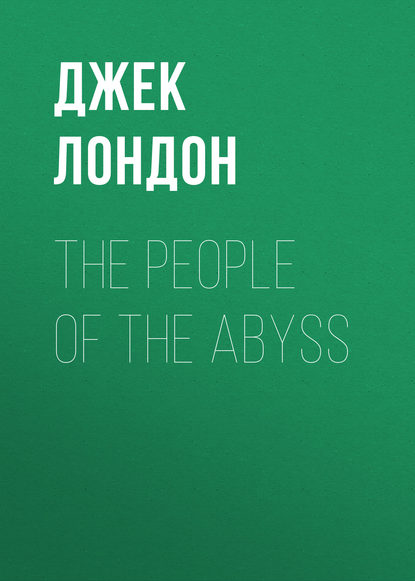По всем вопросам обращайтесь на: info@litportal.ru
(©) 2003-2024.
✖
The People of the Abyss
Настройки чтения
Размер шрифта
Высота строк
Поля
The Carpenter nodded. He had tried them all.
“Then what?” I demanded
And I was informed that I was sent directly to bed. “Call you at half after five in the mornin’, an’ you get up an’ take a ‘sluice’ – if there’s any soap. Then breakfast, same as supper, three parts o’ skilly an’ a six-ounce loaf.”
“’Tisn’t always six ounces,” corrected the Carter.
“’Tisn’t, no; an’ often that sour you can ’ardly eat it. When first I started I couldn’t eat the skilly nor the bread, but now I can eat my own an’ another man’s portion.”
“I could eat three other men’s portions,” said the Carter. “I ’aven’t ’ad a bit this blessed day.”
“Then what?”
“Then you’ve got to do your task, pick four pounds of oakum, or clean an’ scrub, or break ten to eleven hundredweight o’ stones. I don’t ’ave to break stones; I’m past sixty, you see. They’ll make you do it, though. You’re young an’ strong.”
“What I don’t like,” grumbled the Carter, “is to be locked up in a cell to pick oakum. It’s too much like prison.”
“But suppose, after you’ve had your night’s sleep, you refuse to pick oakum, or break stones, or do any work at all?” I asked.
“No fear you’ll refuse the second time; they’ll run you in,” answered the Carpenter. “Wouldn’t advise you to try it on, my lad.”
“Then comes dinner,” he went on. “Eight ounces of bread, one and a arf ounces of cheese, an’ cold water. Then you finish your task an’ ’ave supper, same as before, three parts o’ skilly any six ounces o’ bread. Then to bed, six o’clock, an’ next mornin’ you’re turned loose, provided you’ve finished your task.”
We had long since left Mile End Road, and after traversing a gloomy maze of narrow, winding streets, we came to Poplar Workhouse. On a low stone wall we spread our handkerchiefs, and each in his handkerchief put all his worldly possessions, with the exception of the “bit o’ baccy” down his sock. And then, as the last light was fading from the drab-coloured sky, the wind blowing cheerless and cold, we stood, with our pitiful little bundles in our hands, a forlorn group at the workhouse door.
Three working girls came along, and one looked pityingly at me; as she passed I followed her with my eyes, and she still looked pityingly back at me. The old men she did not notice. Dear Christ, she pitied me, young and vigorous and strong, but she had no pity for the two old men who stood by my side! She was a young woman, and I was a young man, and what vague sex promptings impelled her to pity me put her sentiment on the lowest plane. Pity for old men is an altruistic feeling, and besides, the workhouse door is the accustomed place for old men. So she showed no pity for them, only for me, who deserved it least or not at all. Not in honour do grey hairs go down to the grave in London Town.
On one side the door was a bell handle, on the other side a press button.
“Ring the bell,” said the Carter to me.
And just as I ordinarily would at anybody’s door, I pulled out the handle and rang a peal.
“Oh! Oh!” they cried in one terrified voice. “Not so ’ard!”
I let go, and they looked reproachfully at me, as though I had imperilled their chance for a bed and three parts of skilly. Nobody came. Luckily it was the wrong bell, and I felt better.
“Press the button,” I said to the Carpenter.
“No, no, wait a bit,” the Carter hurriedly interposed.
From all of which I drew the conclusion that a poorhouse porter, who commonly draws a yearly salary of from seven to nine pounds, is a very finicky and important personage, and cannot be treated too fastidiously by – paupers.
So we waited, ten times a decent interval, when the Carter stealthily advanced a timid forefinger to the button, and gave it the faintest, shortest possible push. I have looked at waiting men where life or death was in the issue; but anxious suspense showed less plainly on their faces than it showed on the faces of these two men as they waited on the coming of the porter.
He came. He barely looked at us. “Full up,” he said and shut the door.
“Another night of it,” groaned the Carpenter. In the dim light the Carter looked wan and grey.
Indiscriminate charity is vicious, say the professional philanthropists. Well, I resolved to be vicious.
“Come on; get your knife out and come here,” I said to the Carter, drawing him into a dark alley.
He glared at me in a frightened manner, and tried to draw back. Possibly he took me for a latter-day Jack-the-Ripper, with a penchant for elderly male paupers. Or he may have thought I was inveigling him into the commission of some desperate crime. Anyway, he was frightened.
It will be remembered, at the outset, that I sewed a pound inside my stoker’s singlet under the armpit. This was my emergency fund, and I was now called upon to use it for the first time.
Not until I had gone through the acts of a contortionist, and shown the round coin sewed in, did I succeed in getting the Carter’s help. Even then his hand was trembling so that I was afraid he would cut me instead of the stitches, and I was forced to take the knife away and do it myself. Out rolled the gold piece, a fortune in their hungry eyes; and away we stampeded for the nearest coffee-house.
Of course I had to explain to them that I was merely an investigator, a social student, seeking to find out how the other half lived. And at once they shut up like clams. I was not of their kind; my speech had changed, the tones of my voice were different, in short, I was a superior, and they were superbly class conscious.
“What will you have?” I asked, as the waiter came for the order.
“Two slices an’ a cup of tea,” meekly said the Carter.
“Two slices an’ a cup of tea,” meekly said the Carpenter.
Stop a moment, and consider the situation. Here were two men, invited by me into the coffee-house. They had seen my gold piece, and they could understand that I was no pauper. One had eaten a ha’penny roll that day, the other had eaten nothing. And they called for “two slices an’ a cup of tea!” Each man had given a tu’penny order. “Two slices,” by the way, means two slices of bread and butter.
This was the same degraded humility that had characterised their attitude toward the poorhouse porter. But I wouldn’t have it. Step by step I increased their order – eggs, rashers of bacon, more eggs, more bacon, more tea, more slices and so forth – they denying wistfully all the while that they cared for anything more, and devouring it ravenously as fast as it arrived.
“First cup o’ tea I’ve ’ad in a fortnight,” said the Carter.
“Wonderful tea, that,” said the Carpenter.
They each drank two pints of it, and I assure you that it was slops. It resembled tea less than lager beer resembles champagne. Nay, it was “water-bewitched,” and did not resemble tea at all.
It was curious, after the first shock, to notice the effect the food had on them. At first they were melancholy, and talked of the divers times they had contemplated suicide. The Carter, not a week before, had stood on the bridge and looked at the water, and pondered the question. Water, the Carpenter insisted with heat, was a bad route. He, for one, he knew, would struggle. A bullet was “’andier,” but how under the sun was he to get hold of a revolver? That was the rub.
They grew more cheerful as the hot “tea” soaked in, and talked more about themselves. The Carter had buried his wife and children, with the exception of one son, who grew to manhood and helped him in his little business. Then the thing happened. The son, a man of thirty-one, died of the smallpox. No sooner was this over than the father came down with fever and went to the hospital for three months. Then he was done for. He came out weak, debilitated, no strong young son to stand by him, his little business gone glimmering, and not a farthing. The thing had happened, and the game was up. No chance for an old man to start again. Friends all poor and unable to help. He had tried for work when they were putting up the stands for the first Coronation parade. “An’ I got fair sick of the answer: ‘No! no! no!’ It rang in my ears at night when I tried to sleep, always the same, ‘No! no! no!’” Only the past week he had answered an advertisement in Hackney, and on giving his age was told, “Oh, too old, too old by far.”
The Carpenter had been born in the army, where his father had served twenty-two years. Likewise, his two brothers had gone into the army; one, troop sergeant-major of the Seventh Hussars, dying in India after the Mutiny; the other, after nine years under Roberts in the East, had been lost in Egypt. The Carpenter had not gone into the army, so here he was, still on the planet.
“But ’ere, give me your ’and,” he said, ripping open his ragged shirt. “I’m fit for the anatomist, that’s all. I’m wastin’ away, sir, actually wastin’ away for want of food. Feel my ribs an’ you’ll see.”
I put my hand under his shirt and felt. The skin was stretched like parchment over the bones, and the sensation produced was for all the world like running one’s hand over a washboard.
“Seven years o’ bliss I ’ad,” he said. “A good missus and three bonnie lassies. But they all died. Scarlet fever took the girls inside a fortnight.”
“After this, sir,” said the Carter, indicating the spread, and desiring to turn the conversation into more cheerful channels; “after this, I wouldn’t be able to eat a workhouse breakfast in the morning.”
“Nor I,” agreed the Carpenter, and they fell to discussing belly delights and the fine dishes their respective wives had cooked in the old days.
“I’ve gone three days and never broke my fast,” said the Carter.
“And I, five,” his companion added, turning gloomy with the memory of it. “Five days once, with nothing on my stomach but a bit of orange peel, an’ outraged nature wouldn’t stand it, sir, an’ I near died. Sometimes, walkin’ the streets at night, I’ve ben that desperate I’ve made up my mind to win the horse or lose the saddle. You know what I mean, sir – to commit some big robbery. But when mornin’ come, there was I, too weak from ’unger an’ cold to ’arm a mouse.”
As their poor vitals warmed to the food, they began to expand and wax boastful, and to talk politics. I can only say that they talked politics as well as the average middle-class man, and a great deal better than some of the middle-class men I have heard. What surprised me was the hold they had on the world, its geography and peoples, and on recent and contemporaneous history. As I say, they were not fools, these two men. They were merely old, and their children had undutifully failed to grow up and give them a place by the fire.

















